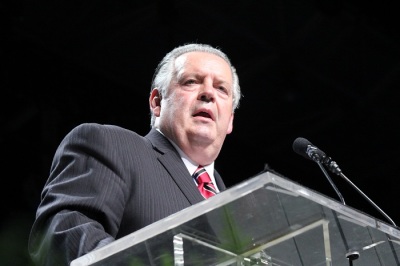John Lewis: An American treasure
A virtual American giant has passed away. Georgia Congressman John Lewis has died at the age of 80. He was indeed a larger than life figure, despite his diminutive stature. He had the heart of a lion and cast a giant shadow over America for more than half a century.
While still a college student at American Baptist College in Nashville, John Lewis took part in a nonviolent sit-in at the lunch counters in downtown Nashville, commencing a long ministry of nonviolent protest against racial injustice. And, for him it was a divine calling. Although this fact was ignored by virtually all of the secular media, John Lewis, like his mentor Dr. King, was an ordained Baptist minister. And, like Dr. King, he believed in “soul power.”

In 1961 John Lewis was one of the original “freedom riders,” savagely beaten in the process of seeking to integrate the interstate bus system. He helped organize and spoke at the August 28, 1963 march where Dr. King delivered his incandescent “I Have a Dream” speech.
John Lewis was horribly beaten by police at the Edmund Pettus Bridge in Selma in 1965, marching for black people to have the right to vote in Alabama. Yet, having drunk deeply from the well of Dr. King's and Rev. C. T. Vivian’s non-violent theology, he lost the leadership of the Student Nonviolent Coordinating Committee, known as SNCC, to the much more violent Stokely C. Carmichael. Having embraced Dr. King’s wisdom, he refused to abandon it. Until the end of his life, Congressman Lewis never strayed from his bedrock, foundational belief that the nonviolent power to forgive was redemptive to all concerned — victim as well as victimized. To the end of his life, he espoused loving your enemy, and that those you would change you must first love. He was always telling young admirers “don't let the struggle make you bitter.”
Many years after being so terribly beaten during the Freedom Rides, a former Klansman, Edwin Wilson, came forward to ask for Congressman Lewis’s forgiveness for having been the perpetrator of that attack in 1961. Congressman Lewis freely granted his forgiveness, as he did when he accepted former Alabama Gov. George Wallace’s apology in Wallace’s later years. His tearful reconciliation with the former Klansman should give all Americans hope that America will indeed eventually live up to the promises of its founding documents.
On a more personal note, I vividly remember my first reaction to the film footage of the mounted Alabama state troopers charging the peaceful crowd of marchers seeking the right to vote in Alabama. I, like most Americans, was outraged and sickened by the brutality of what I was seeing take place in America. The only thing I can compare it to was the visceral national reaction to the film footage of George Floyd's murder at the hands of a Minneapolis policeman.
The first film footage of Selma was shown on national television on Sunday night. One network broke into its premiere of its Sunday night movie. Ironically, the movie was “Judgment at Nuremberg.” Just a few years earlier, this movie had had an enormous impact on my life. It was a dramatization of the trial of the Nazi judges who administered a gross perversion of justice in the Third Reich.
At one point in the movie, the chief justice of the Nuremberg Tribunal, played by Spencer Tracy, is pressed to go easy on the Nazi judges. It was pointed out to him that the Russians had blockaded Berlin (1948) and America needed the support of the German people. The general pressing for leniency said,
“Isn't the goal to survive, anyway you can?” Tracey replied, “Survive is what? A country is not a rock or a piece of dirt. A country is what it stands for when standing for something costs. Let the whole world know this is what we stand for: justice, truth, and the value of a single human being.” I will never forget that scene. It is etched forever in my mind. And now I was a virtual eyewitness to Alabama law enforcement standing for the exact opposite.
While serving as President of the Ethics & Religious Liberty Commission (1988-2013), I had the privilege of representing Southern Baptists at one of the annual marches commemorating the tragic events of “Bloody Sunday” in Selma in 1965. I had previously interacted with Congressman Lewis on several occasions on legislative issues, but it was especially moving to march with him across the infamous bridge in Selma. Adding to the moment was the experience of literally walking side by side on the march with Taylor Branch, the author of the epic Pulitzer Prize winning three volume history of the Civil Rights Movement. His running commentary as we walked added invaluable additional insights. The whole experience is one of the treasured memories of my life.
John Lewis is, and will remain, an American treasure. The arc of his life from lunch counter sit-ins to beloved Congressional leader should serve as an inspiration to all Americans to continue pressing forward to bring to fruition Dr. King’s dream of a nation where people truly “will not be judged by the colour of their skin, but by the content of their character.”
John Lewis never gave up on Dr. King’s dream and neither will I. When John Lewis was once criticized for not being “black enough” by those seeking more radical legislation, Mr. Lewis replied, “I follow my conscience, not my complexion.” May every American aspire to a similar moral standard for our beliefs and our behavior. And may each of us resolve, as long as we have breath, to fight for an America that stands for justice, truth, and the value of a single human being.
Dr. Richard Land is president of Southern Evangelical Seminary in Charlotte, North Carolina, and is part of an advisory group for President Donald Trump





























